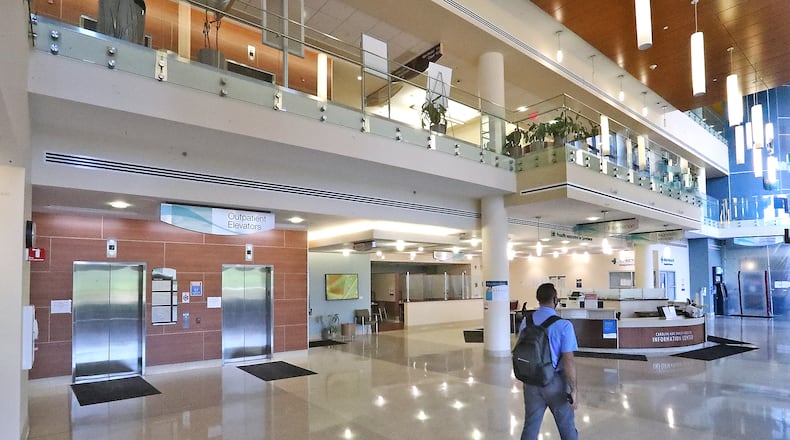“Because this isn’t the first time we’ve been through a surge, we have the benefit of lessons learned from months already spent dealing with the pandemic while continuing with our day to day operations including elective surgeries,” said Jennifer Robinson, a Public Relations and Communications Manager for Bon Secours Mercy Health.
Robinson said that the hospital network has a task force in place that is closely monitoring pandemic trends and the impact it may have on service delivery and offerings.
Mercy Health operates the Springfield Regional Medical Center and the Urbana Hospital.
After setting a pandemic-record earlier in the week, hospitals in the west central Ohio region (Champaign, Clark, Darke, Greene, Miami, Montgomery, Preble and Shelby counties) reported 525 coronavirus patients hospitalized as of late last week. That’s more than were hospitalized at any time during last winter’s peak.
The southwest region of the state (Adams, Brown, Butler, Clermont, Clinton, Hamilton, Highland and Warren counties) set a record late last week with 837 coronavirus patients hospitalized.
Statewide, nearly 6,500 coronavirus hospitalizations were reported late last week, setting a record for the seventh-consecutive day. They account for one-third of all Ohio hospitalizations with 1,324 in intensive-care units and 877 on ventilators.
Hospitals are struggling with a flood of coronavirus patients, as well as staff who catch the virus needing to stay home, Greater Dayton Area Hospital Association President Sarah Hackenbracht said.
That association also includes hospital networks that have a presence in both Clark and Champaign counties.
“If it sounds like we’re ringing the alarm bells, we are,” Hackenbracht said. “We are at a very, very dangerous place as it relates to COVID-19 and its impact on normal medical care as we know it. When people hear the terminology elective procedures, everyone immediately assumes that these are things that are not medically necessary, when in fact, they are very much medically necessary procedures.”
That could include someone who is waiting on a hip or a knee replacement and is living with significant pain, she said, but that is not something that has to be taken care of in the next 24 to 48 hours.
Robinson said that Mercy Health employees in the Springfield market are not required to be vaccinated at this point, though the hospital network strongly encourages it.
“Mercy Health continues to monitor and evaluate the rapidly changing information regarding the CMS COVID-19 vaccine mandate. We continue to strongly recommend that our employees receive the COVID-19 vaccine, but will not require it, in our Springfield market,” she said.
Kettering Health announced elective procedures would be delayed effective Wednesday. Affected patients will be directly notified if their surgery or procedure is postponed. This comes after Reid Health and hospital networks in Columbus postponed elective procedures in December, and two networks in the Cincinnati area also did so this week.
Premier Health will postpone any nonemergency surgeries and procedures that require an overnight stay beginning today through Jan. 31.
Beavercreek-resident Rich Cohen, 71, was supposed to have knee surgery Jan. 25 at Miami Valley South to deal with his chronic knee pain but it was rescheduled for March due to Premier’s new policy.
“My knee hurts and it’s limited me but it’s not going to kill me … I can understand why they need to use their resources to take care of people who need it the most,” he said.


